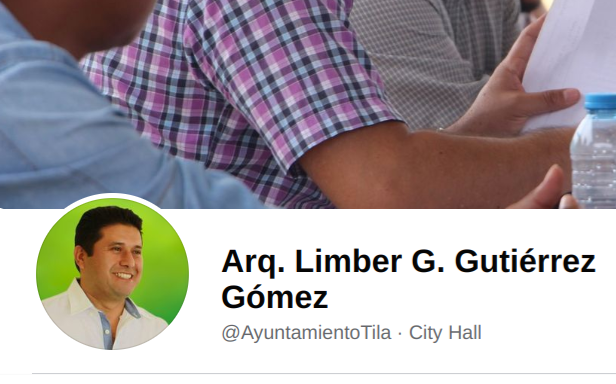
By Luis Hernández Navarro
For centuries, the Lord of Tila has been revered with fervor. On the Feast of Corpus Christi, the Sacred Cross, Holy Week and the miraculous renewal of the 15th of January thousands of faithful devotees celebrate him. This devotion for him goes beyond borders, they travel from Central America, Tabasco, Campeche, and Veracruz to worship him. Singers like Chico Che, Joan Sebastian, and José Manuel Figuroa venerate him.
Tila, the place where the ebony image is found, the place known as the land of miracles, is also at once an ejido, a township, and a municipality in the state of Chiapas. Unfortunately, it not only a route through which religious pilgrimages pass, but also undocumented migrants, arms and drugs from Central America.
Since the end of 1994, the north of Chiapas is known not only for being the ceremonial seat of the Black Christ, but also for the bloody violence unleashed in its municipalities and communities by the paramilitary group Desarollo, Paz y Justicia. Although the organization which was born out of Magisterial Campesino Solidarity formally split and gave rise to two distinctive groups, which they christened as the Union of Indigenous, Agricultural and Forestry Communities (Uciaf) and the Organization of Peasant Agricultural Producers, they continue to operate with official protection as armed civilians.
Despite the years that have passed since then, the attacks against the rebel Choles do not stop. Just last September 11th, a demonstration march of ejidatarios of Tila was attacked with firearms by paramilitaries. At least two people died.
The conflict is neither, in its essence, a problem between poor people nor between indigenous people. Nor is it a religious or inter-community problem. It’s origin is other than that. In Tila there is a terrible chiefdom linked to, among other forces, the Chiapan family that governs the state using different party acronyms, and the policy of counterinsurgency against the autonomous processes of the Zapatistas and the member communities of the National Indigenous Congress (CNI).
The chiefdom in Tila es headed up by Petalcingo Límberg architect and builder Gregorio Gutiérrez Gómez and his wife, Sandra Luz Cruz Espinosa, originally from Pijijiapan. Under the cover of the Green Ecologist Party of Mexico they have, without interruption, occupied the municipal presidency, either directly or through their family members since the period of 2008-2010 (https://bit.ly/2ZS7A5K).
Before that date, Límberg – at the time a militant of the Institutional Revolutionary Party, served as the director of Public Works during the mayorship of Juan José Díaz Solórzano (2005-2007), involved with Paz y Justicia. They accused him of using the budget for financing his political campaign, leaving various projects in bad condition and others unfinished.
He finished his first term as municipal president with ranches, registered cattle, quarter horses, residences, luxury vehicles, and public transportation concessions on the Salto de Agua – Palenque highway. His wife Sandra succeeded him in the office, between 2011 and 2012. (https://bit.ly/3mxvw7Y) The council of good government of the Zapatista caracol Que Habla para Todos, denounced death threats, robberies, damages to private property, and dispossessions against the community of San Patricio by the paramilitaries of Paz y Justicia and their derivatives.
Límberg was again elected mayor for the period of 2012-2015, in the midst of accusations of buying votes, fraud and violence (with several wounded and one dead between supporters of the Green Party and the PRI).
For the administration of 2015-2018, the architect put his cousin, Professor Édgar Leopoldo Gómez Gutiérrez, as mayor and his wife, Atty. Sandra Luz Cruz Espinosa as the local deputy, both of the Green Party. Finally, arguing gender equity, the Greens ran as a candidate Juanita Fabiola Velazquez, who after winning, requested an indefinite leave of absence for the Límberg cousin, who was later accused by several communities of theft (https://bit.ly/2Hc93x2).
To reinforce his dominion, Límberg again made himself the municipal president of Tila for the period between 2018-21. For this he has the support of builders (he himself is accused of being one), truck drivers, merchants, cattle ranchers, paramilitaries of Paz y Justicia and their minions, the Chiapan family and the forces of law and order.
The chieftain has confronted with everything possible, paramilitaries and terror included, the Chol ejidatarios of Tila, the Zapatista support bases, and the pastoral workers who recovered the Tila ejido, expelled the municipality from its territory, and began to govern themselves without asking permission, on December 16, 2015.
In addition to refusing to enter the Program of Certification of Ejido Rights and Urban Land Titling (Procede), the ejidatarios of Tila have won, one after another, the legal battles they have undertaken to return to their hands the 130 hectares of the Fundo Legal, which the municipality has sought to take away from them.
The agrarian controversy in Tila is not just a matter of land: it is also a dispute to confront the power of the chiefdom, stop the privatization of land, reconstitute the Chol community, build autonomy, and resist the policies of counterinsurgency.
This article was originally published in Spanish by La Jornada on September 22nd, 2020. https://www.jornada.com.mx/2020/09/22/opinion/017a1pol This English interpretation has been re-published by Schools for Chiapas.
